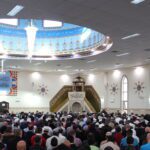The temple in Jerusalem is central to the Bible. The first temple was destroyed by the Babylonians in 587 BC. It was rebuilt; the Judaism at the time of Jesus and his apostles is called Second Temple Judaism. This temple was destroyed in AD 70 by the Roman military leader Titus. It has not been rebuilt.
With the long-term absence of a temple, Judaism adjusted its practices. Rabbis and synagogues became more important than the high priest. Prayers replaced animal sacrifices. Temple Judaism became Rabbinic Judaism.
Muhammad and Rabbinic Judaism
Muhammad was born AD 570, when there had been no Jewish temple for 500 years. He did not observe Temple Judaism but Rabbinic Judaism. This is significant because Muhammad copied Jewish practices:
Narrated Ibn ‘Abbas: The Prophet [Muhammad] used to copy the people of the Scriptures [Jews and Christians] in matters in which there was no order from Allah. (Sahih al-Bukhari 5917; vol 7, bk 72, no 799)
Narrated Al-Bara: We prayed along with the Prophet facing Jerusalem for sixteen or seventeen months. Then Allah ordered him to turn his face towards the Qibla (in Mecca) (Sahih al-Bukhari 4492; vol 6, bk 60, no 19)
But Muhammad did not have experience of temple Judaism.
Temple Judaism
The Holy Spirit showed important truths through the operation of the temple. As Hebrews says:
The Holy Spirit was showing by this [the structure of temple worship] that the way into the Most Holy Place had not yet been disclosed as long as the first tabernacle was still standing. (Hebrews 9:8)
The temple taught, first, that God comes to dwell with us. We are not on a journey from creation to God. Second, the temple taught that we need a priest to mediate between a holy God and a sinful people. Third, we need a sacrifice of atonement to turn aside his anger and pay for sins. Fourth, since the temple was the place where God’s presence dwelt it was the direction of prayer. It was how you faced God. Fifth, the New Creation is described as a perfect temple where God and humanity dwell together, and humanity perfectly worships God (see Ezek 40–48 and Rev 21–22).
This is what the Holy Spirit taught through the temple. However, Rabbinic Judaism does not practice these things because there is no longer any temple, and it was Rabbinic Judaism that Muhammad observed and copied.
The Qur’an and Temple Theology
When we read the Qur’an with temple theology in mind, what do we notice? In the Qur’an God does not come to creation to dwell with his people, instead, we are on a journey to God: “God originates creations, then causes it to return. Then you will be returned to him.” (Qur’an 30:11). There is no priesthood in Islam. There is no sacrifice of atonement in Islam to bring you into the presence of God.
When the Qur’an speaks about paradise and the new creation it does not describe it in terms of a temple and worship (Qur’an 56:1-56). Instead, it is a place of pleasure and reward, where no worship is required.
When Muhammad does refer to the temple in Jerusalem, he calls it a mosque (Qur’an 17:7). He shows no understanding of its function as a temple. In the Qur’an, Muhammad tells many stories about Moses, Aaron, and Jesus, but none of them have to do with the temple. In the Qur’an, Moses, Aaron, and Jesus are Rabbinic Jews not Temple Jews. We see this with Aaron: he is only a prophet not a priest. Just as Jesus is only a prophet in the Qur’an, Aaron is only a prophet too.
The Qur’an does not attempt to refute the biblical temple doctrines, like it attempts to refute the Trinity and the Incarnation, it is unaware of them, because Muhammad never saw them.
If you wanted to change the Bible into the Qur’an you would need to rip out of it every reference to the tabernacle/temple; every reference to God coming to dwell with this people; every reference to the priests, sacrifices of atonement; every reference to the new creation and the temple. If we did this, what would we be left with? Not much, just a hollow shell. This is what the Qur’an is.
Judaism, Islam, Christianity and Temple Theology
To understand Christianity, you need to understand biblical Temple Judaism, the Judaism of the prophets. To understand Islam, you need to understand the practices of Rabbinic Judaism. This historical context of Islam is ‘No Temple Judaism’. You will understand the Qur’an better if you realise it has no temple theology.
Without an understanding of the temple Muslims do not have the foundations for understanding Jesus and the gospel. Jesus is God coming to dwell with us as God did with the temple. He is the place where God and humanity meet (Jn 1:14; 2:19–22). He is the true priest who represents God to the people and the people to God. He is the true sacrifice to turn aside the anger of God (Heb 7–10).















